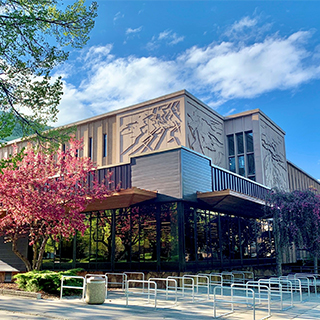Information Literacy Curriculum
About Our Curriculum
Mansfield Library's information literacy curriculum is based on the Association of College & Research Libraries' Framework for Information Literacy for Higher Education (ACRL Framework).
Our library faculty focus on reaching students in the following ways:
- instruction in first-year experience classes
- instruction in advanced college writing courses
- instruction in research-focused graduate courses and graduate student orientations
- workshops
- credit classes taught by library faculty
- individual research assistance and consultations
At every opportunity, librarians seek to facilitate the successful delivery of information literacy content by teaching faculty in the disciplines. Librarians may provide consultative services to teaching faculty to develop research assignments; promote the use of tutorials and other learning materials; and encourage student engagement at the Reference Desk and research consultations.
Areas of Focus
The strategic integration of information literacy into the curriculum begins with first-year initiatives that serve as the basis for information literacy instruction in the disciplines at the intermediate and advanced levels. The first-year curriculum integration is designed to reach students in courses that are a part of the standard university curriculum, particularly Introductory College Writing, and in required courses with a large enrollment. Targeted First-year Courses: College Writing I, College Writing I Plus, Introduction to Public Speaking.
Online learning objects can be customized and integrated into courses in Moodle, include assessment options, and are discoverable for self-study. This information literacy integration builds on the Introductory College Writing integration at the first-year level.
The integration of information literacy continues to address the university Writing Course Guidelines in Advanced College Writing courses. Librarians collaborate with faculty to integrate required information literacy learning outcomes into their courses. Librarians may provide instruction, learning materials or online resources, or partner with faculty to design research activities or assignments.
Instruction is provided in graduate courses and graduate student orientations, per faculty or program request, as well as in workshops.
Workshops address specific student research needs, such as navigating copyright, finding government information, managing references, and conducting a literature review, are offered periodically.
- LSCI 210Y Who Owns Culture? An Introduction to Copyright
- ENST 201 Environmental Information Resources
- Special topics courses, independent study, and internships are periodically offered.
- Librarians maintain availability for individual and small group research assistance.
- Librarians and reference employees provide research assistance at the Reference Desk and via phone, email and live chat.
Revision History
- Mended May 2023 by Reference and Instruction team
- Revised January 2020
- Updated February 2015 by: Samantha Hines, Karen Jaskar, Sue Samson, and Megan Stark
- Prepared and updated in August 2009 by Library Instruction Curriculum Task Force and Library Instruction Coordinator: Julie Edwards, Samantha Hines, Tammy Ravas, Sue Samson, and Kate Zoellner
- October 2008
